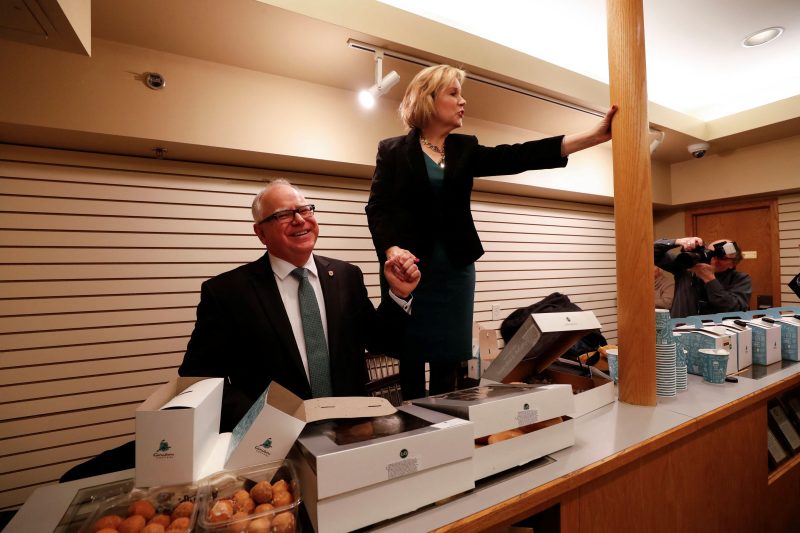
Tim Walz was a 31-year-old teacher when a drunken-driving arrest almost cost him his career

When Vice President Harris, the Democratic presidential nominee, added Minnesota Gov. Tim Walz to her ticket on Tuesday, she touted him as a coach and educator. Walz, in accepting the role, likened his excitement to “the first day of school.”
The message was clear: This man is a teacher.
Almost three decades ago, however, Walz nearly gave up the career that’s now at the center of his political identity. The reason was a drunken-driving incident in northwestern Nebraska, where he was a 31-year-old teacher and football coach at the time.
Late on a Saturday in September 1995, Walz was driving a silver Mazda on Route 385 outside Alliance, Neb., according to police records. He was going 96 mph in a 55-mph zone when he was pulled over by a Nebraska state trooper, the records show.
According to the documents, the trooper smelled alcohol and administered a field sobriety test, which Walz failed. The young teacher then also failed a preliminary breath test. Walz submitted to a blood test at a nearby hospital before being booked at the county jail, charged with driving under the influence.
The following year, Walz pleaded guilty to a lesser charge of reckless driving, a misdemeanor, and paid a fine of $200. In a hearing about the plea agreement, Walz’s attorney told a judge that his client had resigned all extracurricular responsibilities at Alliance High School, including his coaching role, and offered to resign his teaching position as well, according to a hearing transcript.
“He, I think, takes the position that he’s a role model for the students there,” said the attorney, Russell Harford. “He let them down, he let himself down. Because of that, he was ready to resign his position. Fortunately, the principal talked him out of resigning from school.”
Alliance’s principal at the time, Richard W. Boness, died earlier this year; Harford did not respond to a request for comment. The prosecutor in the case, Rex C. Nowlan, said he couldn’t recall details of the incident and that he had no other interactions with Walz when he lived in Nebraska.
The high school’s head football coach in that era, Jeff Tomlin, said that Walz worked especially with the team’s linebackers and that it was a loss for the players when he quit coaching after his arrest.
“He’s a man of conviction,” Tomlin said Tuesday in an interview with The Washington Post. “He’s a man of principle. He did what he felt was right. We supported that.”
Harford, the attorney, told the court that Walz had turned the episode into a teaching opportunity. “Now he is, I guess, ministering, so to speak, to the students about the bad things that can happen to you if you drink and drive and get caught for drinking and driving,” he said.
Walz lost his license for 90 days, his attorney said. He no longer drinks, saying he prefers Diet Mountain Dew.
Walz left Nebraska in 1996 and relocated to Mankato, Minn., where he continued teaching and coaching football. It would be another decade before he entered politics.
The arrest has come up from time to time as he has pursued elected office, but it hasn’t been a primary line of attack for his opponents. In 2006, when he first ran for Congress, Walz’s campaign manager at the time offered an account of the arrest that contradicted court records.
The campaign manager, Kerry Greeley, told the Post Bulletin, a newspaper in Rochester, Minn., that Walz was speeding but not drunk and that the incident stemmed from a misunderstanding caused by Walz’s partial deafness. Walz suffered hearing loss during his time in a field artillery regiment in the National Guard, a condition for which he underwent surgery in 2005.
“He couldn’t understand what the officer was saying to him,” said Greeley, who appears only to have worked for Walz on his 2006 campaign, according to her LinkedIn profile, and who did not respond to requests for comment.
In 2018, however, when Walz ran for governor, he took responsibility for failing the field sobriety and breath tests in an interview with the Star Tribune in Minneapolis, saying he had been watching college football with friends. His wife, Gwen Walz, a fellow teacher, recalled telling him, “You have obligations to people. You can’t make dumb choices.”
In response to questions about the episode, a spokesman for the Harris-Walz campaign pointed to the Star Tribune interview and declined to comment further.
Walz is among a long list of politicians who have come to regret reckless choices made behind the wheel. As a candidate for president in 2000, George W. Bush acknowledged being arrested for drunken driving 24 years earlier. In 2013, Sen. Mike Crapo (R-Idaho) pleaded guilty to drunken driving after an arrest late the previous year in Alexandria, Va. He told the officer who pulled him over that he had consumed “several shots of vodka,” according to court records.
